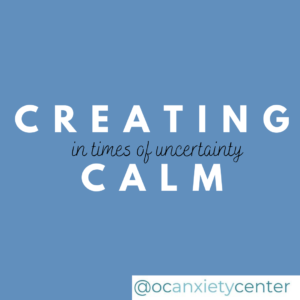Unprecedented events often lead to anxiety and worry, as we do not know how to respond to them. We often try to control what we can (whether actually useful or not), and over-analyze information while worrying about what the future may hold. We are seeing these patterns in our patients (and our friends and family). While common, these behaviors may not be helpful in alleviating the issues, nor decreasing anxiety.
We’ve noticed a few trends working with people these past weeks that may be useful to share with everyone:
We should expect to feel more anxious and stressed given current events.
-
-
It’s normal right now to have higher levels of stress:
- With shelter in place orders we are limited to our ability to engage in regular activities that we use as structural anchors in our lives (work, social interactions, shopping, eating out).
- Being at home most of the day poses its own challenges: If home alone, the isolation can be difficult while home with a partner and children pose its own issues.
- Financial concerns continue to loom larger for most, as we experience work slowdowns, stoppages and furloughs. For those us blessed enough to continue working, the challenges from working from home, or as an essential worker also affect us.
-
We can affect our level of stress in both positive and negative ways
-
-
There are activities we engage in that negatively affect our mood and stress levels we should try to minimize:
-
- News
- Social media
- Focusing on the unknown, and/or giving into negative emotions.
- Isolating
-
-
Alternatively, there are activities that can positively affect our mood, while decreasing stress levels:
-
- Creating daily structure to help our bodies know what to expect (e.g., consistent sleeping, eating and work patterns).
- Behavioral activation: engage in hobbies and activities that are enjoyable, even if they’re modified due to social distancing or otherwise. Exercise is a great way to take care of oneself.
- Self care, such as showering, dressing, and eating are vital to mood stabilization.
-
-
There are many things with COVID-19 that are out of our ability to control or affect. Very often doing nothing, which essentially we’re being asked to do, can be frustrating, leaving us feeling powerless. However, it is important to remember that doing ‘nothing’ is actually helping slow the spread of the virus, giving medical professionals a fighting chance to help those who are infected, while giving researchers time to find better ways to combat the virus.
Staying healthy, physically, spiritually and emotionally, is good for each one of us, and all of us.

